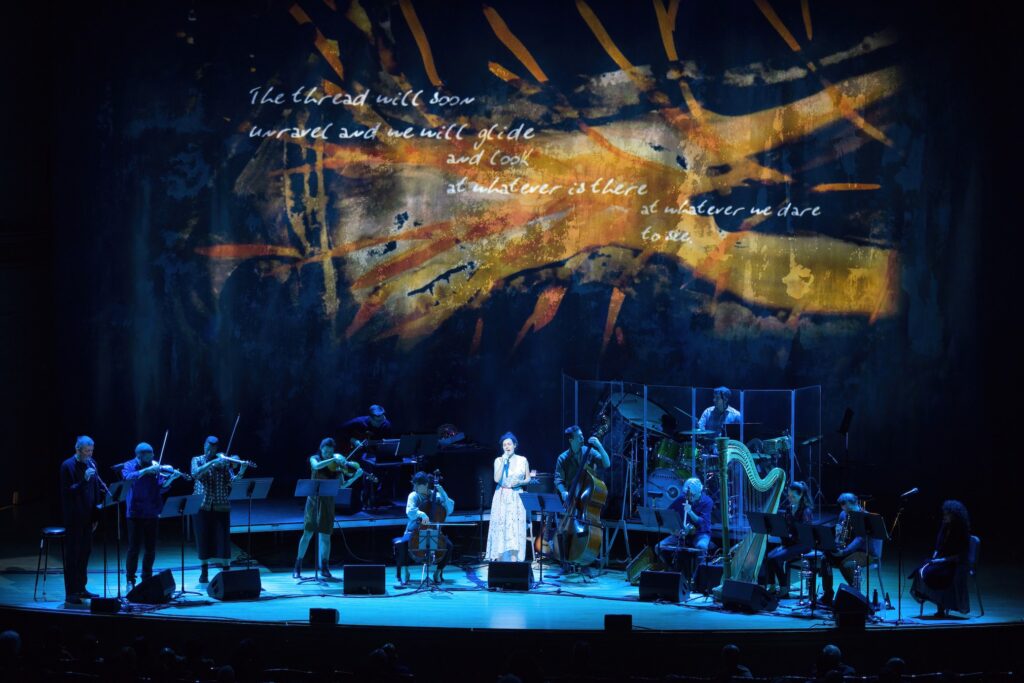Osvaldo Golijov’s masterful “Falling Out of Time” lights a path through grief

Nora Fischer singing on Sunday at Symphony Hall in the Boston Symphony and Celebrity Series production of Osvaldo Golijov’s “Falling Out of Time.” Photo: Hilary Scott/BSO
There was a moment two decades ago when Osvaldo Golijov seemed poised to become the leading voice of 21st Century new music. In his early forties, basking in the succcess of his La Pasión según San Marcos, the Argentine-born, Brookline-based composer followed one critical and popular triumph with another: Ainadamar, Ayre, Azul.
Then, suddenly, writer’s block and a plagiarism controversy combined to derail his progress. But the last several years have seen Golijov returning to his early-aughts form. Sunday afternoon marked another milestone: the Symphony Hall premiere, co-presented by the Boston Symphony and Celebrity Series, of his song cycle Falling Out of Time.
Scored for three singers and an amplified ensemble, the piece is based on David Grossman’s novel about a father coming to terms with the death of his son. Premiered by Silk Road Ensemble in 2019, Falling Out of Time is often predictably dark, intense and searing. Yet the score also features – despite its heavy subject matter – music of enchanting beauty and constant invention.
Much of this unfolds in the writing for the instrumental group. Here, across nearly 90 minutes, Golijov weaves his way through a bewildering variety of musical reference points and genres: drifting vocalizations; cool jazz riffs; echoes of funk, blues, rock, EDM, near-Eastern music, and more. Through all of it — the stylistic alleyways and switchbacks that are fascinating to hear as one follows Golijov’s line of thought — the composer also doesn’t hesitate to push instruments to their limits or present them in fresh contexts.
Though billed as multicultural, the song cycle’s orchestration is largely traditional, with the only non-Western scoring involving a kamancheh (a bowed traditional Persian instrument). Golijov uses the last sparingly but memorably: its most noteworthy appearance comes in “Go Now,” where kamancheh and violin engage in a lengthy, impassioned, quasi-improvisatory duet.
Also fresh and wildly unpredictable is Golijov’s writing for percussion, especially the drum kit, which lets loose at a couple of points with some extended, John Bonham-worthy explosions. In one of them, the instrument even engages in a duet with an amplified violin.
How all of this holds together and coheres is the mystery and wonder of Golijov’s craft. And yet, the composer’s handling of his musical materials is deeply intentional: the score culminates in a movement called “Ayeka (Where Are You?),” in which instruments and voices let loose in a swooning, darkly jazzy moment of cathartic release.
That last episode landed with plenty of force on Sunday. All told, the singing and the instrumental performances in this demanding and unorthodox work came across with immediacy, even if the unfolding of its overall narrative felt, at times, meandering.
The most gripping passages in the late going belong to a character named Centaur, a figure from Grossman’s novel who functions as a kind of Greek chorus. Sung by Nora Fischer, this role emerged with a galvanizing focus. At once evincing pain and unsentimental wisdom, Fischer channeled a huge dynamic and stylistic range with total musical command, and with an absorbing dramatic clarity. So did Biella da Costa and Yoni Rechter, who brought an agonizing rawness and beauty to their singing in the roles of the dead boy’s parents.
Sunday’s ad hoc instrumental group sounded perfectly at home in Golijov’s impossible-to-pigeonhole style. Violinist Johnny Gandelsman, the de facto conductor, led with assurance; his duet with Kayhan Kalhor’s kamancheh was enchantingly well-blended.
Dan Brantigan’s trumpet and flugelhorn contributions brought a welcome brightness to the proceedings, while Jeremy Flower’s modular synthesizer contributions proved otherworldly. Shane Shanahan navigated Golijov’s percussion writing with aplomb. And Mazz Swift delivered a stunning actualization of the shredding, distortion-laced violin part in the duet with drum kit.
As often happens at Symphony Hall, though, the amplification occasionally wreaked havoc with balances. Early on, vocal lines were submerged; later, full ensemble moments devolved into blurry washes of sound. Brantigan’s solos in “Ayeka” were, at times, nearly inaudible. Best were the quiet spots, like the ethereal fadeout of “Breathe.”
Though the production was designated as semi-staged, the only musician to step away from the ensemble and utilize the dais in any sort of performative sense was Fischer. Otherwise, Sunday’s was basically a concert performance, with projections of the text and abstract images appearing on a screen behind the performers.
Perhaps that was for the best. Falling Out of Time’s expressive riches are, fundamentally, illuminated by the music, and its themes — of the importance of processing grief both individually and communally — came through with a minimum of stagecraft.
The Aizuri Quartet plays music by Clara Schumann, Bartók, Tanya Tagaq, and Haydn Wednesday at 8 p.m. at Pickman Hall. celebrityseries.org
Posted in Performances



